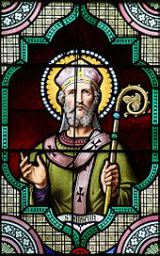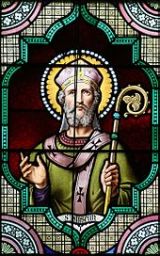
Anselm of Canterbury (c. 1033-1109) systematically set forth his argument for the necessity of Christ’s Incarnation and atoning death in his famous book Cur Deus Homo? A common misconception people have about God’s forgiveness is that He forgives purely out of love and compassion, without any regard to the demands of justice. But God’s justice and mercy are not antithetical; indeed we may receive God’s mercy precisely because of God’s justice against our sins having been satisfied on our behalf in the atonement of Christ. He is both just and the justifier of him who believes in Jesus (Rom. 3:36). Below, in dialogue with Boso (abbot of Bec), Anselm addresses this common misconception. The excerpt is from Cur Deus Homo, Book I, Chapter XII:
CHAPTER XII.
Whether it were proper for God to put away sins by compassion alone, without any payment of debt.
Anselm. Let us return and consider whether it were proper for God to put away sins by compassion alone, without any payment of the honor taken from him.
Boso. I do not see why it is not proper.
Anselm. To remit sin in this manner is nothing else than not to punish; and since it is not right to cancel sin without compensation or punishment; if it be not punished, then is it passed by undischarged.
Boso. What you say is reasonable.
Anselm. It is not fitting for God to pass over anything in his kingdom undischarged.
Boso. If I wish to oppose this, I fear to sin.
Anselm. It is, therefore, not proper for God thus to pass over sin unpunished.
Boso. Thus it follows.
Anselm. There is also another thing which follows if sin be passed by unpunished, viz., that with God there will be no difference between the guilty and the not guilty; and this is unbecoming to God.
Boso. I cannot deny it.
Anselm. Observe this also. Every one knows that justice to man is regulated by law, so that, according to the requirements of law, the measure of award is bestowed by God.
Boso. This is our belief.
Anselm. But if sin is neither paid for nor punished, it is subject to no law.
Boso. I cannot conceive it to be otherwise.
Anselm. Injustice, therefore, if it is cancelled by compassion alone, is more free than justice, which seems very inconsistent. And to these is also added a further incongruity, viz., that it makes injustice like God. For as God is subject to no law, so neither is injustice.
Boso. I cannot withstand your reasoning. But when God commands us in every case to forgive those who trespass against us, it seems inconsistent to enjoin a thing upon us which it is not proper for him to do himself.
Anselm. There is no inconsistency in God’s commanding us not to take upon ourselves what belongs to Him alone. For to execute vengeance belongs to none but Him who is Lord of all; for when the powers of the world rightly accomplish this end, God himself does it who appointed them for the purpose.
Boso. You have obviated the difficulty which I thought to exist; but there is another to which I would like to have your answer. For since God is so free as to be subject to no law, and to the judgment of no one, and is so merciful as that nothing more merciful can be conceived; and nothing is right or fit save as he wills; it seems a strange thing for us to say that be is wholly unwilling or unable to put away an injury done to himself, when we are wont to apply to him for indulgence with regard to those offences which we commit against others.
Anselm. What you say of God’s liberty and choice and compassion is true; but we ought so to interpret these things as that they may not seem to interfere with His dignity. For there is no liberty except as regards what is best or fitting; nor should that be called mercy which does anything improper for the Divine character. Moreover, when it is said that what God wishes is just, and that what He does not wish is unjust, we must not understand that if God wished anything improper it would be just, simply because he wished it. For if God wishes to lie, we must not conclude that it is right to lie, but rather that he is not God. For no will can ever wish to lie, unless truth in it is impaired, nay, unless the will itself be impaired by forsaking truth. When, then, it is said: “If God wishes to lie,” the meaning is simply this: “If the nature of God is such as that he wishes to lie;” and, therefore, it does not follow that falsehood is right, except it be understood in the same manner as when we speak of two impossible things: “If this be true, then that follows; because neither this nor that is true;” as if a man should say: “Supposing water to be dry, and fire to be moist;” for neither is the case. Therefore, with regard to these things, to speak the whole truth: If God desires a thing, it is right that he should desire that which involves no unfitness. For if God chooses that it should rain, it is right that it should rain; and if he desires that any man should die, then is it right that he should die. Wherefore, if it be not fitting for God to do anything unjustly, or out of course, it does not belong to his liberty or compassion or will to let the sinner go unpunished who makes no return to God of what the sinner has defrauded him.
Boso. You remove from me every possible objection which I had thought of bringing against you.






